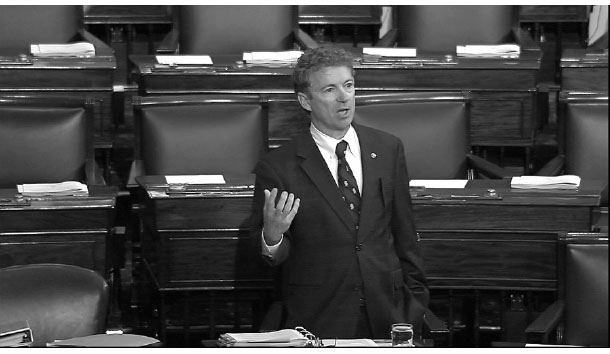The Senate debate over extending three key sections of the egregiously misnamed USA PATRIOT Act is over, and the winner is . . . Sen. Rand Paul.
The losers are clearly Sens. Mitch McConnell and John McCain, both of whom tried desperately to win an extension of what Paul accurately described as “that most unpatriotic of Acts.”
While a number of other senators, mostly Democrats—especially Sen. Ron Wyden (OR)—helped the junior senator from Kentucky in the course of his historic filibuster, it was clearly Paul who bore the main burden of carrying on the debate for so long that the act expired at midnight on June 1, before McConnell & Co. knew what hit them.
In the end, Section 215—the provision in the act that was being interpreted by government and its judicial handmaiden, the secret FISA court, as allowing for the collection of all our data—lay in the dust. Waiting in the wings was the USA Freedom Act, which was touted as a reform bill that would gut Section 215. In reality, the new legislation would simply transfer our purloined data to the big internet and telephone companies, which could then be compelled by the government to hand it over on demand.
And this is the important point: Senator Paul opposed that one, too, while the “reformers” on both the left and the right held it up as a “reasonable” alternative to Section 215. And in his opposition to the replacement legislation, Paul stood alone.
It was at once inspiring and depressing to watch him standing there in the well of the Senate, passionately reminding a people who have apparently forgotten that liberty is worth fighting for—and that the Founding Fathers are likely spinning in their graves. It was inspiring because—well, read:
Let us be clear: We are here tonight because the president continues to conduct an illegal program. We are not collecting the information of spies. We are not collecting the information of terrorists. We are collecting all American citizens’ records all of the time. This is what we fought the revolution over.
Now, people say, “Well, they’re not looking at it. They’re not listening to it.” It’s the tip of the iceberg, what we’re talking about here. And realize that they were dishonest about the program until we caught them. They kept saying over and over again, “We’re not doing this. We’re not collecting your records.” And they were. The head of the intelligence agency lied to the American people, and he still works here. We should be upset. We should be marching in the streets and saying he’s got to go.
People say, “How will we protect ourselves without these programs?” What about using the Constitution? What about using judicial warrants? The Tsarnaev boy, the Boston bomber? They say, “How will we look at his phone records?” Get a warrant! Put his name on it!
The whole speech was a ringing call to arms—and the senator is betting his presidential ambitions on the hope that the American people will respond. It’s a risky bet—and here we get to the depressing part. Because it’s not at all clear that Americans remember who and what they are—or once were.
He’s finished, the pundits proclaimed. The party elders hate him now, and their fury was unrestrained: Rand Paul is just trying to raise money, said Senator McCain. The failed presidential candidate and serial warmonger accused Paul of selling out the security of his country for a pot of gold. McCain was echoed by conservative mandarin George Will, who said Paul was “literally cashing in on his conscientiousness as a libertarian.” Sen. Orrin Hatch fulminated that Paul is in cahoots with “a nest of radicals.” Sen. Marco Rubio, the neocons’ affirmative-action Latino, accused Paul of “reckless spreading of misinformation and political posturing.” The entire Washington Establishment pronounced Senator Paul a political pariah.
But out in the rest of the country—outside that circle of corruption known as the Beltway—there was a stirring. On Twitter, the people were cheering. In homes around the country, Paul’s newly energized supporters were going online and donating to the campaign. And it wasn’t just libertarians: liberals, conservatives, and just plain ordinary nonideological Americans were listening and nodding in agreement.
Paul didn’t start out his campaign in this impassioned mode. Succumbing to the bad advice of Washington “insiders,” he waffled and tried to appease his enemies, whose implacability was soon revealed. But when waffling didn’t work, he tried another tack. Throwing misplaced caution to the wind, he returned to his core beliefs.
Was it enough? Did it make a difference?
Despite the defeat of the USA PATRIOT Act, the USA Freedom Act will soon become law. Paul’s victory was only symbolic. Yet given the wide field of candidates, Paul’s winsome constitutional rhetoric could catapult him to the front of the Republican pack. Washington has lost all respect for Rand Paul, but considering the way the White House and Congress clung to the PATRIOT Act, that just makes him a man of the people.

Leave a Reply